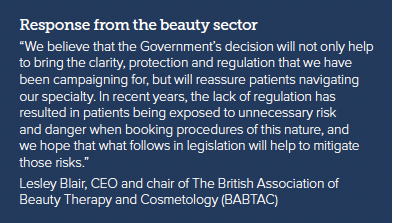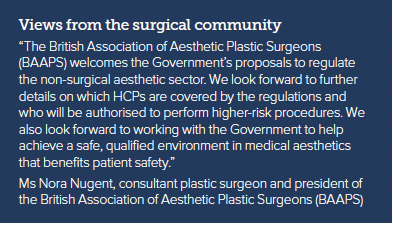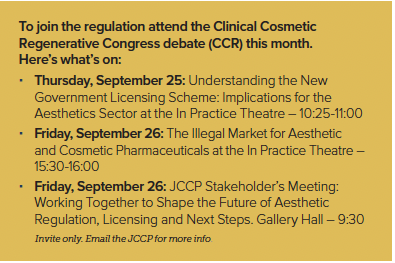Aesthetics explores the Government’s plans to regulate the field and the community’s response
The Department of Health and Social Care (DHSC) has confirmed plans to introduce a national licensing scheme for non-surgical cosmetic procedures in England.1,2
Announced on August 7, 2025, the aim is to establish consistent standards across the aesthetics sector and improve patient safety across England.1,2 The Government notes that the new regulations will be subject to public consultation and parliamentary scrutiny before being introduced.1,2
Specialty overview
This announcement follows a comprehensive public consultation conducted in 2023, which garnered nearly 12,000 responses from a wide range of stakeholders, including members of the public, specialty professionals and regulatory bodies.1,3 The consultation revealed overwhelming support for tighter regulation within the aesthetics sector, reflecting widespread concerns over patient safety, unregulated and unlicensed practitioners and inconsistent standards of care.1,3
Professionals within the field believe a significant factor influencing the regulatory update was the death of Alice Webb in September 2024.1,4 The 33-year-old mother of five passed away at Gloucestershire Royal Hospital after undergoing a non-surgical Brazilian butt lift (BBL) procedure performed by a non-healthcare professional (HCP).4 Webb’s death led to new guidelines issued by the Joint Council for Cosmetic Practitioners (JCCP), the Chartered Institute of Environmental Health (CIEH) and the British Beauty Council, but further measures were called for to enhance patient protection and safety.5
Currently, there are no mandatory licensing requirements for individuals offering procedures such as botulinum toxin, dermal fillers or other aesthetic treatments, unless the treatment involves a surgical procedure or is carried out by a HCP in a regulated setting.1,2 This has led to variation in practitioner qualifications and oversight, particularly for higher-risk procedures. This regulatory update follows the Scottish Government’s recent proposals in June 2025, following the December 2024 consultation.6 Key developments following the consultation include plans to introduce a licensing regime for higher-risk procedures delivered by non-HCPs in England.6
The proposed framework
The proposed framework would mandate that practitioners offering high-risk procedures, such as the non-surgical BBL, thread lifting procedures and hair restoration surgery, will need to be qualified HCPs operating from Care Quality Commission (CQC)-registered premises.1
The initial consultation outlined a traffic-light tiered system: green-light procedures, such as microneedling and non-ablative laser hair removal; amber-light procedures, including botulinum toxin injections and dermal fillers; and red-light procedures involving augmentation of the breast, genitals or buttocks, as well as hair restoration surgery.1 The recent Government announcement specified lower-risk treatments, including botulinum toxin, lip filler and facial dermal fillers, will come under stricter oversight through a new local authority licensing scheme, requiring practitioners to be licensed by local authorities and meet strict hygiene, training and insurance standards.1
Once regulations are introduced, practitioners who breach the rules on the highest risk procedures will be subject to CQC enforcement and financial penalties.1 The Government has not mandated that lower-risk cosmetic procedures be performed exclusively by HCPs; under the new licensing scheme, such treatments may still be carried out by licensed non-HCPs, subject to defined standards and, for certain procedures, oversight requirements.1
According to the Government, priority will be given to introducing regulations to restrict the highest-risk procedures first – such as the injection of fillers into the breasts and genitals.1 A public consultation will be published early next year to gather views on the range of procedures that should be included in these restrictions.1
The legislation will also introduce age restrictions for certain procedures for individuals under the age of 18, unless authorised by a HCP, and grant enforcement powers to local authorities and the CQC.1 Providers who fail to comply may face penalties or be banned from practising.1
Strengthening the field
Discussing the new regulatory update, Amy Bird, nurse prescriber and chair of the British Association of Medical Aesthetic Nurses (BAMAN), points out the benefit the new scheme may have for patient safety. She says, “For patients, it would mean greater transparency – clear evidence of a practitioner’s qualifications, regulatory status and adherence to safety protocols – so they can make safe, informed choices.” Acknowledging the serious consequences of insufficient regulation, Professor David Sines, executive chair of the JCCP, explains, “The number of new practitioners entering the field has increased, with many lacking adequate training. This has resulted in high-profile cases in which patients have suffered physical and psychological harm due to a lack of training.” Professor Sines elaborates, “While such cases are not representative of the sector as a whole, they underscore the need to eliminate unwarranted variation and ensure consistently safe, effective clinical experiences for the public.”
The Irish College of Aesthetic Medicine (ICAM) also demonstrates support, stating, “ICAM welcomes any progress towards stronger regulation of the aesthetics sector. We commend the hard work and determination of our sister organisation, the British College of Aesthetic Medicine (BCAM), and urge the Irish Government and relevant regulatory bodies to go beyond incremental change and move toward comprehensive reform.”
Having practiced aesthetics for more than 30 years across England and Ireland, aesthetic practitioner Dr Patrick Treacy views it as an opportunity to elevate standards. He explains, “The proposed licensing scheme has the potential to elevate standards by mandating practitioner qualifications, hygiene protocols and indemnity insurance, addressing the current lack of oversight in England’s aesthetics sector.”
Stakeholder concerns
While greater regulation within the specialty is widely recognised as beneficial, the new Government licensing scheme has been met with caution by the wider community. Nurse prescriber and clinical lead of the Aesthetics Clinical Advisory Board Sharon Bennett comments, “This legislation is not, and should not be, focused solely on preventing non-medical practitioners from performing injectable BBLs, despite the media emphasis on this point.” Bennett continues, “The consultation and subsequent response suggest that the Government has not yet developed a nuanced understanding of medical aesthetics, continuing to categorise treatments as purely ‘cosmetic’ rather than recognising their clinical or medical dimensions. This gap in knowledge is concerning, and could negatively impact the final legislative outcome.” Bennett concludes, “Once legislation is enacted, it becomes difficult to amend and carries the risk of being expedited without informed consideration. Frequent ministerial changes, budgetary constraints and limited specialist insight further exacerbate this concern.”

After sharing his views on social media, aesthetic practitioner Dr Steven Land told Aesthetics he sees the proposals as a “holding pattern.” He says, “The Government has been forced to make a statement through Webb’s death, alongside the cases of iatrogenic botulism in the East of England. The update contained nothing we did not already know. They have only now released the feedback from the first consultation, 18 months overdue, and are merely proposing another consultation to take place in no less than six months’ time.”
Dr Treacy also voices concerns in regard to the Government timelines, suggesting it’s a delay tactic. He explains, “While the announcement signals intent to address the ‘Wild West’ of aesthetics, it feels more like a political delay tactic than a robust reform. The Health and Care Act 2022 empowered the Government to regulate non-surgical procedures, yet three years later, the scheme remains in consultation, with implementation delayed until 2026-2027.”1
Dr Catherine Fairris, aesthetic practitioner and president of BCAM, notes that while public pressure has prompted Government action, there remains reluctance to fully address non-HCPs. She says, “Financial considerations play a role, as the initial public consultation noted the sector’s significant economic value, over £20 billion annually, creating tension between protecting the public and supporting specialty growth. Consequently, the Government has limited only the most visibly high-risk procedures, falling short of measures that would most effectively safeguard public safety.”
Supporting safe practice
Considering the final legislation and the potential impact on the field, Dr Fairris suggests, “The Government should require that any injectable procedure involving a prescription medication, or one that may require a prescription medication to address complications, be carried out only on CQC-regulated premises, under the direct supervision of a qualified HCP present during the procedure.” Dr Fairris continues, “As the Government has shown no appetite to restrict these procedures exclusively to HCPs, this approach represents the most realistic means of ensuring the highest level of public protection within the current limitations.”
Bird advises that sector stakeholders should use the period leading up to the 2026 consultation to act proactively and in coordination. This includes, “Gathering robust evidence on patient harm and complication management, and presenting a unified position on key safety issues – in particular, advocating for a ban on non-HCPs performing injectable treatments and ensuring that all complications are reported through the Medicines and Healthcare products Regulatory Agency’s Yellow Card Scheme,” says Bird.7
Similarly, Professor Sines encourages practitioners to start aligning themselves with the introduced measures. He comments, “Practitioners should operate from safe, infection-free premises, hold appropriate medical indemnity and work within their professional scope. They should also engage with professional associations and follow progress updates over the next 12 months as Government licensing proposals develop.”

The next steps
Following the announcement on August 7, the Government’s forthcoming public consultation on non-surgical cosmetic procedures, scheduled for early 2026, will focus on finalising the scope of procedures to be regulated under the new licensing scheme.1 Practitioners working within the field are advised to follow the latest updates relating to the proposed legislation, and ensure they operate within safe and professional scopes and present a united stance on patient safety.

References:
- Department of Health and Social Care, Licensing of Non-Surgical Cosmetic Procedures in England (London: GOV.UK, 2025) Licensing of non-surgical cosmetic procedures – GOV.UK
- BBC News, Licences needed for Botox clinics in cosmetics crackdown, BBC News. 7 August 2025. Available at: https://www.bbc.co.uk/news/articles/czd03ejd28lo
- Hill Dickinson LLP, Licensing of non-surgical cosmetic procedures in England – government consultation now published. 21 September 2023. Available at: https://www.hilldickinson.com/insights/articles/licensing-non-surgical-cosmetic-procedures-england-government-consultation-now
- BBC News, ‘BBL death’ needs more investigating, says coroner. BBC News. 3 October 2024. Available at: https://www.bbc.co.uk/news/articles/crl825g5wpgo
- Joint Council for Cosmetic Practitioners (JCCP), JCCP launches new guidance on buttock augmentation & other body contouring procedures – Guidance for enforcement by local authority authorised officers. 10 October 2024. Available at: https://www.jccp.org.uk/NewsEvent/jccp-launches-new-guidance-on-buttock-augmentation-other-body-contouring-procedures-guidance-for-enforcement-by-local-authority-authorised-officers
- Scottish Government, Regulation and licensing of non-surgical cosmetic procedures (Scottish Government, 2024) https://www.gov.scot/news/regulation-and-licensing-of-non-surgical-cosmetic-procedures/
- Medicines and Healthcare products Regulatory Agency (MHRA), Yellow Card: Making medicines and medical devices safer (MHRA, 2025) https://yellowcard.mhra.gov.uk/

